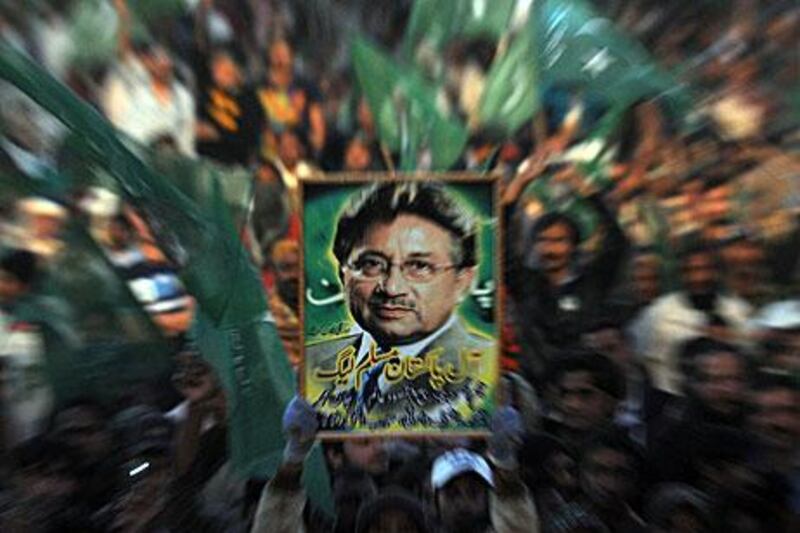ISLAMABAD // Pervez Musharraf ruled Pakistan single-handedly and unchallenged for almost a decade.
But the former general faces an uphill task to stage a political comeback as he plans to return home after years of self-exile in Dubai and London.
Mr Musharraf told supporters in Karachi via a video link from Dubai on Sunday that he would return this month, despite possible arrest and security fears.
But the former military ruler has many opponents to face - from political rivals to a hostile judiciary and Islamist militants.
And the country is in turmoil.
The civilian government led by President Asif Ali Zardari is at odds with the powerful military, which was Mr Musharraf's power base as president and which has ruled Pakistan for almost half its existence.
In a clear reference to the military, the prime minister, Yusuf Raza Gilani, said recently there was a conspiracy to topple the government.
Mr Musharraf told a Pakistani newspaper, The News, recently that many retired senior officers supported him. But his support among those leading the army now is unclear, particularly the position of the army chief, Gen Ashfaq Kayani. Mr Musharraf, who came to power in a bloodless coup in 1999, hand-picked Gen Kayani to replace him as the chief of the army staff in 2007.
Despite the disarray among the major parties, Mr Musharraf still needs strong allies for his All Pakistan Muslim League and faces the rising popularity of opposition politician Imran Khan, one of Pakistan's most popular former cricketers.
But none of the major political parties has shown an interest in forging and alliance, and Mr Musharraf's party has failed to spark widespread support.
But the former general has money.
He faces possible arrest on his return after an antiterrorism court declared him a fugitive for failing to respond to accusations he failed to provide proper security for the former prime minister, Benazir Bhutto - Mr Zardari's wife - who was assassinated in a gun and bomb attack after an election rally in 2007.
Last August, the court ordered confiscation of all property and the freezing of Mr Musharraf's bank accounts in Pakistan after he again failed to respond.
Mr Musharraf has denied suggestions he or his security agencies had any role in Mrs Bhutto's murder.
But a United Nations commission of inquiry in 2010 said any credible investigation could not rule out the possibility that members of the Pakistani military and security establishment were involved in murder. But it stopped short of saying who it believed was guilty.
Born in New Delhi in August 1943, Mr Musharraf arrived in Pakistan with his parents a day after the partition of British India into Pakistan and India in 1947.
Mr Musharraf was hugely popular when he seized power in 1999 and promised to return genuine democracy in Pakistan and stamp out corruption.
But he gradually lost popularity when he started making political compromises to stay in power.
His enemies accuse him of betraying Islam by caving in to US pressure to abandon support for the Taliban government hosting Al Qaeda in Afghanistan after the September 11 attacks.
He narrowly escaped two Al Qaeda-inspired assassination attempts when he was president.
Mr Musharraf held elections in 2002, but his critics say they were rigged in favour of his allies.
His popularity plummeted after he became embroiled in a row with the judiciary and briefly imposed a state of emergency in 2007, sacking senior judges and imposing restrictions on media.
His allies suffered a humiliating defeat in 2008 and the new coalition government led by Mr Zardari threatened to impeach him, which ultimately led to his resignation and then to his exile.
But despite criticism, the straight-talking Mr Musharraf says he has the courage to take Pakistan out of the mass of problems ranging from growing militancy to a failing economy.
"I know how to run this country more than anyone else," he told the gathering of up to 7,000 supporters in the southern city of Karachi in the video link address.
But many analysts believe he is mistaken.
"He's a non-starter," Talat Masood, a retired general turned political analyst said.
"He has highly inflated view of himself which I think will get deflated when he will arrive in Pakistan."
foreign.desk@thenational.ae





